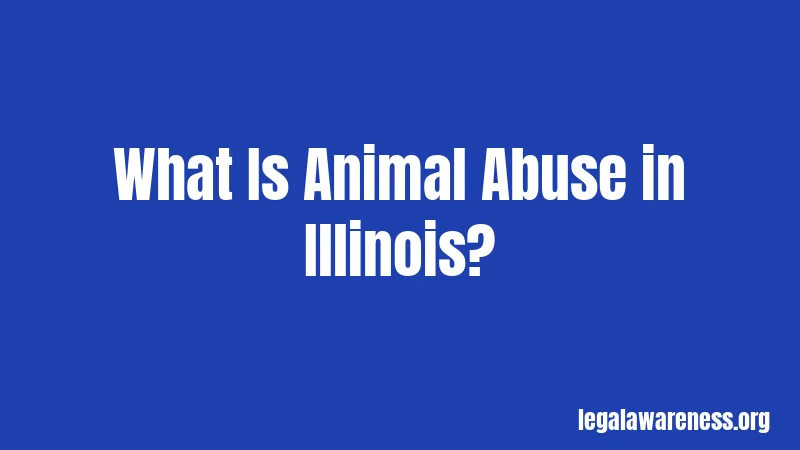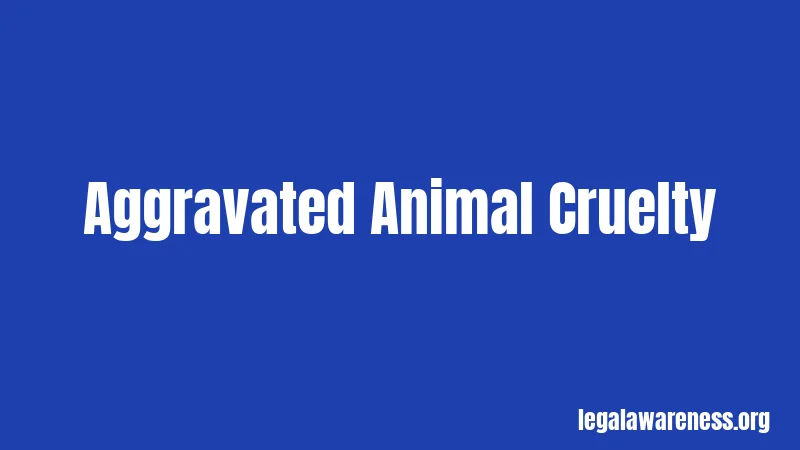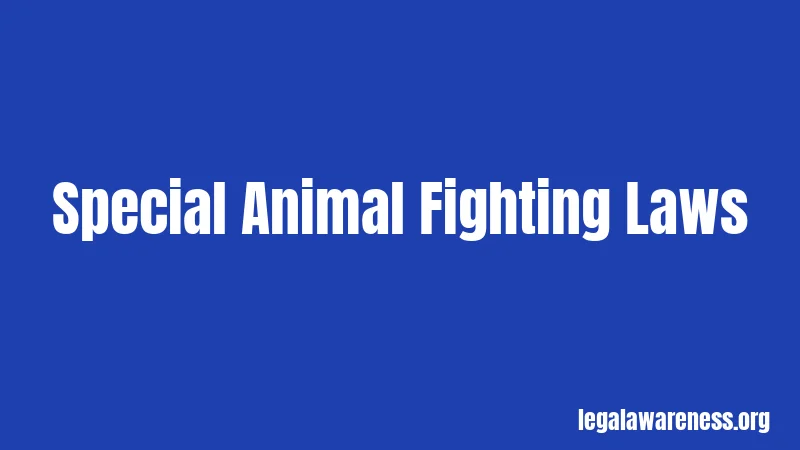Animal Abuse Laws in Illinois (2026): Penalties Hit Hard
Most people don’t realize how strict Illinois really is about animal abuse. Seriously. The state ranks near the top in the country for animal protection laws. Break these rules and you could face jail time, hefty fines, or even a permanent ban on owning pets.
Let’s break down exactly what counts as animal abuse in Illinois and what happens if you cross the line.
What Is Animal Abuse in Illinois?

Animal abuse means causing unnecessary pain or suffering to any animal. It’s that simple.
The law covers a lot more than just beating or torturing animals. You can face charges for neglect too. Not providing food, water, or shelter is illegal. Abandoning an animal where it could get hurt or starve is also a crime.
Hold on, this part is important. The law doesn’t just protect pets like dogs and cats. It covers all domestic animals and even wildlife in some cases.
Basic Animal Cruelty Laws
What Counts as Cruel Treatment
Illinois law says you can’t beat, torment, starve, or overwork any animal. No person can cruelly treat or otherwise abuse any animal. Period.
You also can’t abandon animals in places where they could become injured or hungry. Leaving them exposed to extreme weather is illegal too. This applies whether you leave your dog tied up outside in freezing temperatures or dump your cat in a random parking lot.
Wondering if this applies to you? If you own or care for an animal, these laws definitely apply.
When Does Cruelty Become a Crime
First-time basic animal cruelty is a Class A misdemeanor. That means up to one year in jail and fines up to $2,500. Not exactly a slap on the wrist.
A second offense? That bumps up to a Class 4 felony. Now we’re talking one to three years in prison. The penalties get serious fast.
Aggravated Animal Cruelty

Okay, pause. This is where things get really serious.
Aggravated cruelty means intentionally causing serious injury or death to a companion animal. Companion animals are pets like dogs and cats that live with you. This isn’t an accident. The law targets people who purposely hurt or kill pets.
First conviction is a Class 4 felony. One to three years in prison. A second conviction jumps to a Class 3 felony. That’s two to five years behind bars.
Honestly, this is the part most people miss. The court can also order psychiatric evaluation and treatment. If you’re a juvenile or an animal hoarder, the court must order psychological help.
Animal Torture
This one’s probably the most serious charge. Animal torture means inflicting extreme physical pain on an animal on purpose. The person has to intend to increase or prolong the pain. It’s motivated by a desire to cause suffering.
Pretty straightforward. This is a Class 3 felony every single time. Two to five years in prison. The court will require psychological evaluation and treatment. No exceptions.
Sound complicated? It’s actually not. If someone purposely tortures an animal to make it suffer, they’re looking at serious prison time.
Special Animal Fighting Laws

Making animals fight is obviously illegal. But Illinois goes further than that. Breeding animals for fighting is illegal. Owning equipment used for fights is illegal. Even just being present at an animal fight is a crime.
You’re gonna love this one. Well, maybe not.
Any participation in animal fighting is a felony. First offense is typically a Class 4 felony. Subsequent offenses are Class 3 felonies. You could face up to five years in prison.
The law applies to dogfighting, cockfighting, and any other animal fights done for entertainment or betting. Authorities can seize animals and any equipment related to fighting. You lose everything.
Protection for Service Animals and Police Dogs
Wait, it gets better. Illinois has extra protections for working animals.
You can’t tease, strike, or tamper with police animals, service animals, or search and rescue dogs. That’s a Class A misdemeanor. Up to one year in jail.
Injuring or killing these animals is much worse. If the animal isn’t killed or totally disabled, it’s a Class 4 felony. If the animal is killed or totally disabled, it jumps to a Class 3 felony.
These protections apply whether the animal is on duty or off duty. They also cover animals still in training.
Dog Tethering Restrictions
Many people assume tethering a dog outside is always fine. They find out the hard way. Don’t be one of them.
Illinois makes it illegal to tether dogs outside under dangerous conditions. The dog could get entangled with other tethered dogs. The weather could be too hot or too cold. The tether could be too short or could choke the dog.
First offense is a misdemeanor. Second offense bumps to a Class 4 felony. Here’s where it gets interesting. Each day you violate this law counts as a separate offense.
Animals Left in Vehicles
I looked this up recently. The rules surprised me. They might surprise you too.
Leaving an animal in a vehicle under dangerous conditions is a misdemeanor. Dangerous conditions usually mean extreme heat or cold without proper ventilation.
Trust me, this works. Even on a 70-degree day, temperatures inside a car can hit 100 degrees fast. Crack a window? Doesn’t matter. Still illegal if the animal is in danger.
Law enforcement and animal control can break into your car to save the animal. They’ll try to contact you first, but they don’t have to wait.
Neglect and Basic Care Requirements
Not sure what counts as proper care? Let me break it down.
Owners must provide adequate food and water. They must provide shelter that protects animals from weather. They must provide veterinary care when needed.
Failing to meet these basic needs is neglect. First offense is typically a misdemeanor. Repeat offenses are felonies.
Right? It’s more common than you think. People don’t realize that just having a pet means you have legal responsibilities.
Penalties and Consequences
Criminal Penalties
Class A Misdemeanor: Up to one year in jail and fines up to $2,500.
Class 4 Felony: One to three years in prison and significant fines.
Class 3 Felony: Two to five years in prison and even higher fines.
Think of it like a traffic ticket, but way more serious.
Additional Consequences
Courts can order psychological or psychiatric evaluation. They can require treatment at your expense. For juveniles and animal hoarders, evaluation and treatment are mandatory.
You could be banned from owning animals. Anyone with two prior convictions for animal cruelty (including dogfighting) will be banned from owning pets or having them in their household.
Personally, I think this law makes sense. People who repeatedly abuse animals shouldn’t have access to more victims.
Financial Penalties
You might have to pay for the animal’s care while the case is pending. You might have to pay veterinary bills. You could lose custody of all your animals permanently.
The costs add up fast. Less severe than murder charges, but still no joke.
When Authorities Can Seize Animals
Here’s what you need to do. Actually, here’s what authorities can do.
Police, animal control, and Department of Agriculture investigators can take temporary custody of animals. They usually issue a notice first. The notice explains what you need to fix and gives you a deadline.
Don’t fix the problem? They impound your animals. Sometimes the animal’s condition is so bad that authorities skip the notice and impound immediately.
You can request a hearing to appeal the impoundment. But you need to act fast and follow the proper procedures.
How to Report Animal Abuse
Confused about the difference? Let me break it down.
If you see animal abuse, neglect, or mistreatment, you need to report it. Contact your local animal control department. You can find them by searching your city or county name plus “animal control.”
You can also contact local law enforcement. If you’re concerned about a puppy mill or pet shop, contact the U.S. Department of Agriculture.
Now, here’s where things get serious. Veterinarians and social service professionals are required by law to report suspected animal cruelty. They don’t have a choice.
Exemptions and Defenses
Not every situation counts as animal abuse. The law has exemptions for certain activities.
Accepted veterinary practices are exempt. Normal farming and animal husbandry practices are exempt. Lawful hunting, fishing, and trapping are exempt. Humane euthanasia by approved methods is exempt.
A person accused of neglect might defend themselves by showing the neglect wasn’t intentional. If you couldn’t reach your pet to provide care due to circumstances beyond your control, that might be a defense.
You’re not alone, this confuses a lot of people. The key is whether you acted intentionally or recklessly.
Connection to Domestic Violence
Okay, this one’s important. There’s a clear link between animal abuse and domestic violence.
Statistics show more than 80 percent of women and children seeking shelter from domestic violence report animal abuse in the home. Illinois law recognizes this connection.
Animals can be included in domestic violence protection orders. This protects both the person and their pets from abusers who use animals as tools of control.
What to Do If You’re Accused
Stay with me here. If you’re accused of animal cruelty, take it seriously.
Don’t make statements to authorities without consulting a lawyer. Anything you say can be used against you. Document any evidence that shows you cared for the animal properly. Save veterinary records, receipts for pet supplies, and witness statements.
Most people don’t realize how strict these laws are. A lawyer experienced in animal cruelty cases can help you understand your options and build a defense.
Recent Law Updates
Illinois continues strengthening animal protection laws. The state currently ranks third in the nation for animal protection according to the Animal Legal Defense Fund.
Recent updates include stronger reporting requirements for veterinarians and social workers. The state has also increased penalties for repeat offenders and expanded protections for service animals.
Don’t worry, we’ll break it down step by step. The main thing to know is that Illinois takes animal welfare seriously and the laws keep getting tougher.
Illinois vs. Other States
Honestly, Illinois is one of the strictest states for animal protection. Many states don’t require psychological evaluation for offenders. Many states don’t mandate reporting by veterinarians.
Illinois goes further than most. The state has detailed provisions for animal fighting, tethering, animals in vehicles, and protection orders that include pets.
This part can be tricky, honestly. Each state has different laws. What’s legal in one state might be a felony in Illinois.
Frequently Asked Questions
Can I face charges for neglect even if I didn’t physically harm my animal?
Yes. Failing to provide food, water, shelter, or medical care is illegal. You don’t have to hit or beat an animal to face animal cruelty charges.
What’s the difference between basic cruelty and aggravated cruelty?
Basic cruelty includes things like beating, starving, or abandoning animals. Aggravated cruelty means intentionally causing serious injury or death to a companion animal. Aggravated cruelty carries harsher penalties.
Are all animal cruelty charges felonies?
No. First-time basic cruelty is usually a Class A misdemeanor. But second offenses and more serious acts like aggravated cruelty or torture are felonies.
Can I be banned from owning pets forever?
Yes. Anyone with two prior animal cruelty convictions will be permanently banned from owning or possessing animals.
What should I do if I witness animal abuse?
Contact your local animal control department or law enforcement immediately. If you know specific details, provide them. The more information you give, the better authorities can investigate.
Final Thoughts
Now you know the basics. Illinois doesn’t mess around when it comes to animal protection. The penalties are real and they hit hard.
If you own or care for animals, make sure you’re meeting their basic needs. Provide food, water, shelter, and medical care. Don’t leave them in dangerous situations.
If you see abuse, report it. If you’re accused of abuse, get legal help immediately.
Stay informed, stay safe, and treat animals with the respect they deserve. When in doubt, look it up or ask a lawyer.
